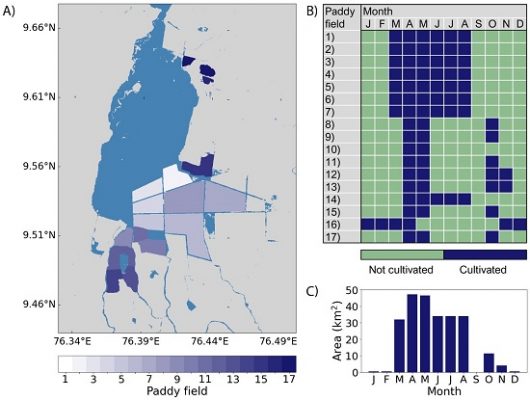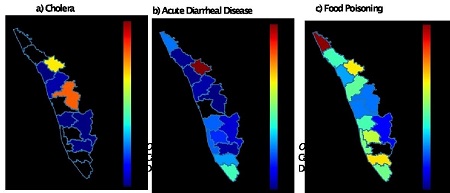Plymouth Marine Laboratory (GB)
WIDGEON – Waterborne Infectious Diseases and Global Earth Observation in the Nearshore – with Plymouth Marine Laboratory, Plymouth, (UK), supported by the service Contractor Nansen Environmental Research Centre (India), Kochi, India, and partners Central Marine Fisheries Research Institute (Kochi, India) and National Institute of Oceanography (Kochi, India). The project was Kicked Off on the 3 November 2021 and it successfully reached Mid Term Review in November 2022.The WIDGEON Project is designed to demonstrate the applications of EO data to address environmental aspects of global health. A dataset on water-borne diseases is being assembled covering India initially, for use with EO data and AI methodologies to elucidate the links between environmental and sanitation conditions and outbreaks of waterborne communicable diseases. At the selected case study site in Ernakulam District in Kerala, India, the status of beaches in the proximity of fishing villages is being monitored, using both in situ and satellite observations. Outreach, capacity building and societal engagement are important parts of the project, In this connection, a teaching syllabus at university level has been prepared in Q4 2022 and it is envisaged to deliver it via dedicated capacity building sessions in Q1 2023 that will be finally covered via a CCN to the contract. A first version of a “sanitation app” for smart phones has been developed for dynamic mapping of sanitation conditions for building resilience within the communities of the study area, to risks from natural disasters such as flooding.
Delineation of flooded areas in relation to health, using EO data: The processing of Sentinel-1 data using Snap for flood mapping in Lake Vembanad has been automated. The work related to flood mapping in Lake Vembanad using both Sentinel-1 and Sentinel-2 data in relationship to health has been presented at the ESA Living Planet Symposium in Bonn, Germany.The cultivation calendar of 17 different paddy fields were identified and masks were created to exclude these paddy fields from the Sentinel-2 and Sentinel-1-based flood maps when waterlogged for rice cultivation.
Identification and characterisation of tourist and local recreational beaches in the case study area: Sampling of environmental and water quality variables was carried out at 6 sampling locations (Munambam, Cherai, Kuzhuppilly, Puthuvype, Kannamali and Chellanam) selected from 21 fishing villages of Ernakulam district, in the south-west coast of India since November 2021 on a monthly basis except for May 2022 due to bad weather. The abundance Escherichia coli was quantified using realtime PCR technique, indicating that faecal contamination was prevalent in coastal regions of Kochi with maximum abundance recorded in samples collected during February and April 2022.
There has been a rise in the number of cases of Leptospirosis in the study area in relation to flooding and inundation during the monsoon season and water samples were processed for identification and quantification of Leptospira bacteria.Data analysis is progressing well and a database on the outbreak of water-associated diseases (cholera, hepatitis, dengue, ADD, chikungunya, leptospirosis, food poisoning, measles) for 2009 – 2020 has been extracted from the Indian Disease Surveillance Program Data (IDSP data), quality checked and arranged district-wise for all the 29 states of India and missing data have been filled from the available literature. Processing of Sentinel-2 data for the study area is underway.
Analyses of datasets using machine learning: Datasets of extreme environmental and weather events for India and globally were identified. Different strategies for machine learning are being evaluated and a random forest regression approach is being considered as a starting point since this is a well-established method and the group has earlier experience with this approach. A next step is to match existing datasets with EO data and data of extreme environmental and weather events.
Develop a prototype curriculum for medical students: Together with Dr. Michael Dillon from the University of Plymouth, a prototype curriculum has been developed, which has been sent to Dr. Ramesh S. Krishamurthy from WHO for feedback.
Smart phone application for a sanitation map: Preparatory sanitation survey has been carried out in the study area, covering demographics, drinking water availability, sanitation practices and diseases.In Q4 2022 information on seasonal variations in the incidence of water-borne diseases and the availability of clean drinking water was collected through household surveys. In total 578 households were surveyed using simple random sampling method from villages of Ernakulam and Alappuzha districts. Based on the results from the sanitation survey, the mobile application ‘CLEANSE’ is being developed as a freely downloadable app.
Next Steps: Project is going according to plan. No deviations are anticipated at present. The team plans to continue working on the manuscript on the delineation of flooded areas, while exploring the use of machine learning techniques for prediction of diseases using the IDSP dataset. A trial version of the CLEANSE app is available for testing and will soon be released to the community at large.

Contributions at the Living Planet Symposium 2022. A Session on Earth Observation for Health was organised with Shubha Sathyendranath, Milton Kampel and Rochelle Schneider as co-chairs, with considerable support from Stefano Ferretti (ESA LPS22 chair). The session gave us an opportunity to place WIDGEON work in a broader context and exchange ideas and approaches with other specialists working on related projects. The presentations were broad ranging, and included the importance of networking, ecological and epidemiological studies, as well as the importance of air and water quality. The presentations and the audience represented a diversity of complementary expertises, and were fully engaged in the session. Audience mentioned the importance of the session topic, which is new for ESA Living Planet Symposia. It was hoped that such sessions would appear in future LPS symposia. There were a number of associated presentations during the poster session. The session complemented Session D2.05 Earth Observation data in Vector Borne Diseases. WIDGEON team also contributed to the Session E1.04.1 Space Capacity Building in the XXI Century. Shubha Sathyendranath participated in the Agora session on Digital Health Trends and Opportunities for EO Commercialisation as a panellist.
Relevant presentations at the Living Planet Symposium 2022:Nandini Menon N, Sreya M, Ranith R, Grinson George, Anas Abdulaziz, Shubha Sathyendranath. 2022. CLEANSE – A mobile application to assess the sanitation status and health of population. Poster presented at the Living Planet Symposium 2022 at Bonn, Germany.
Grinson George, Nandini Menon, Anas Abdulaziz, Gemma Kulk, Bror Jönsson, Shubha Sathyendranath. Space technology and citizen science for building resilience and implementing mitigation measures in a vulnerable tropical coastal region. Poster presented at the Living Planet Symposium 2022 at Bonn, Germany.Kulk, Gemma, Platt, T, Menon, N, Abdul Aziz, A, George, G, Sathyendranath, S. Using multi-spectral remote sensing for flood mapping: A case study in Lake Vembanad, India Shubha Sathyendranath, Milton Kampel and Nandini Menon. Capacity Building through networking: Example of the ONWARD Network. Oral presentation at the Living Planet Symposium 2022 at Bonn, Germany.
Figures
